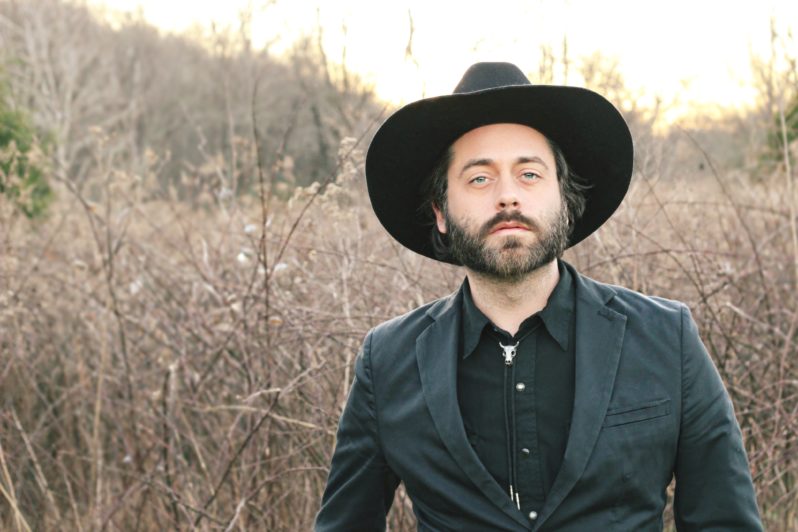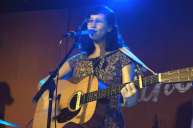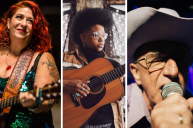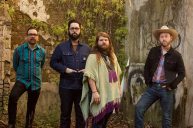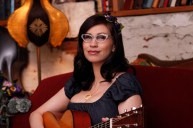[dropcap]I[/dropcap]t wasn't unexpected, but it did come out of the blue. About three months ago, Kevin James Thornton launched the queer country podcast Strange Fire. In tandem with the podcast, Thornton and a small time maintain the Strange Fire magazine, which rounds out the podcast with interviews, live videos, and song premieres. Thornton got the name from an Indigo Girls song. "I'm not necessarily crediting them as queer country trailblazers, but to me personally they are. I played that album on repeat in high school in a time and place where there wasn't much LGBTQ visibility." I spoke with Kevin about the origins of the podcast and why it needs to exist in the first place. The interview was edited and condensed for clarity.
Videos by Wide Open Country
WOC: First of all, I want to say that I am super jealous that I did not do this.
Kevin: It's just a thing that came onto my radar and something inside me was like, "Make this happen right now." So I just did it. Something inside me was like, "the time is right. This needs to happen exactly right now." So I just jumped on it.
WOC: I know that two other musicians, Cindy Emchy and Ryan Cassata are also involved.
Kevin: Yes, they are contributing writers.
WOC: I know Cindy has been doing a lot of folk and sort of punk stuff for a long time -- maybe "anti-folk" is the best way to describe her music. But I've thought of Ryan as mostly a pop musician. So I'm curious how he they both got involved.
Kevin: Ryan actually reached out to me because a couple of his songs have more of a country music vibe. He reached out to say that I could play these songs on the podcast. But then I watched him post on Facebook and saw that he writes a lot about music already and he just knows a lot of queer artists. So I after seeing that I was like, "Would you be interested in writing? We need as many contributors, as we can get right now." And he said yes. And so that's kind of all there was to it, really.
Cindy is the genesis of this whole thing. Cindy created a private Facebook group for queer roots musicians about three or four months ago. She created it and immediately there were like 100 people from all over the country in this little thing sharing their songs. That's why there needs to be a podcast. Cindy created that group and that's how she came onto my radar. Like Ryan, she was just writing about music all the time on Facebook and I'm like, "you should post this on Strange Fire." She agreed and she probably writes on the blog more than anyone.
WOC: And you're a musician, too. Could you describe your music?
Kevin: I've put out five album under the name Indiana Queen and I've had a revolving cast of players which is very Nashville. The first record was definitely a little more country and as the next couple of albums went on we started experimenting with more ambient, folky kind of things. Last year I put out the fifth album as Indiana Queen. That's probably the last Indiana Queen album for a minute. I'm working on a new album right now that'll just be a solo record and it's more of just like an acoustic singer songwriter sort of thing, but very much queer at the same time.
WOC: It sounds like you put out the podcast and the magazine at the same time. Why did you choose to do both?
Kevin: I have been living in Nashville for almost 20 years and while I haven't always done roots music, it's always been a part of my life. I go to writer's rounds all the time and I've been pretty out since the beginning. About five or six years ago I decided I was going to record a country album that was going to be full-on gay country. We didn't really have a name for it at that point. I remember getting on the Internet and just doing some search. Is anyone else out there doing this? And at the time -- again, this is like five or six years ago -- the only thing I really came across was Lavender Country and some more pop country artists who came out. And then about a year ago, I remember seeing an article online that was like "Top 10 Queer Country Artists You Need to Know About." And I was like, "There's 10? Like where are they? That's crazy." Then just a few months ago Cindy put that Facebook group online and there were suddenly a hundred people in it. It just seems like there's a groundswell.
There are so many people that it is a genre in and of itself. All these songs were getting posted to that Facebook group and they were good songs with original voices and good songwriting. I don't know -- just something inside me was like, "I need to try and bring all this together in one thing." So I've always done podcasting and I build websites and I decided I was just gonna go all out and make this happen.
I think the podcast was obvious because it's music and there just needs to be a show. As for the website, I just thought it would be an interesting place beyond the music to get artists' stories out there. A podcast and a website seems like the full vision to me.
WOC: On the podcast you described queer country music as a genre all by itself. Could explain that a little more?
Kevin: When I started the podcast, I was becoming aware that there was a decent amount of people making queer country music and that I could probably pull off a weekly podcast even if I had to eventually start recycling songs. But every single week, new artists from all over the world are reaching out to me. I'm learning about new gay, lesbian, and transgender people making roots music. There's so many people doing it at this point that it's beyond just a little moment where a few queer people are making country music. There's enough people doing it with an original voice. I think it's its own genre.
The other thing that blows me away is that people keep sending me songs and I'm like, "I can't believe how good so much of this is." You know, you would think that the majority of it would be amateur-sounding. But song after song is just so good. There's not a single show that I don't think is an awesome listening experience from beginning to end.
WOC: By genre, do you mean a sub-genre like outlaw country music? What do you think the are the defining characteristics of queer country music?
Kevin: That's exactly it. When I first started the show, like maybe three episodes in, I would've had a more specific answer about what it sounds like. Early on I did think that there was a sound -- somewhere between My Gay Banjo and Lavender Country. I was getting a lot of low-fi recordings with warbly voices that almost went back to really old-school country, almost like Appalachian sort of music. But now I don't know. I'm getting so many different vibes from so many people. I'm a huge fan of Larissa Tandy, who reached out to me. She's from Melbourne, Australia and she's actually living here in Nashville right now. She's doing this really cool Lucinda Williams alt-country rock music. So many people have said Karen and the Sorrows is like Dolly Parton fronting Tom Petty. Another one of my favorite artists is Jared Tyler. He lives in Tulsa, Oklahoma and it's just almost like soulful Stevie Wonder-inspired country music. So many people have reached out to me with different vibes. Now I don't know if I'd say there's one particular sound at this point.
WOC: What you were saying about amateurish music is interesting because anyone who has consumed queer media at all knows that if you watch queer movies from the eighties and nineties they're...quaint. It feels like between the music that Karen showcases at the the Gay Ole Opry shows and the music you're now featuring on Strange Fire, queer country music has matured out of that stage.
Kevin: Very much so. I'm blown away now at the quality of the music I'm getting. Don't get me wrong -- I love a good low fi recording. But I also really love fully produced music and I'm getting a lot of that.
WOC: Where do you think like this good music is coming from where we might not have had it in the nineties?
Kevin: I think the cultural landscape in the nineties was a lot different. I moved to Nashville in the nineties and I remember how totally in the closet the entire country music industry was. Like you would go out to a very small strip of gay bars and it was full. I mean everyone in Nashville, especially back then, worked on Music Row and a huge percentage of those people were gay and lesbian people. But they were totally in the closet because they were afraid they'd lose their job. It was this entire industry catering to a demographic that just didn't accept gay people in the nineties. You know, it's just a totally different landscape that in and the world's changing.
So I think one: in 2018, we've got a younger generation that maybe doesn't quite remember all of that and are just being way more free. And the world has thankfully evolved somewhat. But then the second part of that answer for me is I just think generally queer people have something in them that creates good art and I think you could look at so many examples across genres and throughout history that queer people make good shit.
WOC: What was it like for you to come to Nashville in the nineties and was there a point where you felt, "now I just have to be out?"
Kevin: No. I rolled into town as out and I didn't really even think twice about it. I didn't come here to pursue a traditional country music career. I moved here with an art pop band. And so, I mean, if anything else, it probably made us stand out a little more. In those days, The Nashville Scene wrote about us pretty frequently and it was just because of the gay thing. No one else was doing that in Nashville at the time. But again, I wasn't trying to get a mainstream Nashville record deal. But I know many people who were and almost all of them felt pressured to lie about who they were.
WOC: For people who haven't been to Nashville, I was there about five years ago and at the time there were basically two gay bars in the whole city. Those two bars are like really just down the hill from all the big record companies and recording studios and then steps away from the bro country bars.
Kevin: We probably have actually maybe three or four gay bars, but yes, you're right. There is that like one little strip that has a bar on either end of it and that is sort of our weirdo gay neighborhood. I don't know why it's not growing because Nashville has certainly grown.
WOC: Some readers might ask, "why does there need to be a separate space for queer country music? They're already accepted." Why do you feel like there needs to be a podcast or a website specifically about queer country music?
Kevin: That is a deeper societal question. When a group does not have a voice, when a group has been oppressed, you have to stand up and fight for a voice and that's not making yourself separate. That's just trying to stand up and get a little piece of the pie, to try and gain a little power for your community. As far as why does there need to be a separate genre? Nobody decided that. It's not like we just like got together and said, "you know what, everyone, we're gonna make a queer country movement." Queer people just started sort of reclaiming music that belonged to them, but maybe they felt like they never could be a part of.
Roots music traditionally has belonged in the south in religious communities and conservative communities that have for not accepted queer people for the majority of their existence. And that is changing. So yeah, so now queer people are picking up the acoustic guitar again and maybe writing songs that sound reminiscent of their upbringing. For me, I think of my days in the southern Baptist Church. Or there are people from the South and the music makes them feel something from their roots.So, why does there need to be a separate genre? That's not really the question. It's just there's this wave of queer people making roots music and there's no stopping it.
WOC: Do you think that you'll start doing a concert series or are there specifically queer places for musicians in Nashville?
Kevin: No, there's totally not. I would love to. I have lots of ideas I would love for Strange Fire to keep getting bigger and bigger. Right now it is a bit of a side project for me. I would love for it to become more of a main project, but that'll be a matter of time as the listenership grows.
AmericanaFest is coming up and that is like an old-school Nashville music festival. For the very first time there's a queer showcase at AmericanaFest sponsored by Rolling Stone Country. I mean, that's, that's pretty big stuff. I'm going to be there doing coverage for a Strange Fire. I think it'd be amazing if there was some sort of more regular showcase.
Most of the artists that are reaching out to me are not in Nashville. There's a kind of a very small community that I'm aware of, like myself, Mercy Bell, and Larissa Tandy. There's a newer artists who just put out his first EP and it charted on the iTunes country chart at 25. His name is Blake Haney. There's maybe a whole bunch of other Nashville songwriters that are gay or lesbian or trans, but maybe have not stepped across the line and come out. Also, I'm a roots music artist and maybe that's the difference. There's a whole bunch of gay and lesbian people making music in Nashville but they're making music for mainstream country people.
WOC: We've seen some examples of straight allies on mainstream country radio, like Kacey Musgraves. Do you think in our lifetimes there'll be like a country radio song that is by and about queer people?
Kevin: I don't know. I mean, the world is headed in such a bizarro direction. There's definitely a segment of progressive people who like roots music. Here in Nashville we have a radio station called Lightning 100 and it mainstream country, but it also plays Americana and roots. Nashville is in and of itself a pretty progressive-ish little place. Not compared to like New York or something, but for a small southern city, there's a lot of progressive people here. Lightning 100 reflects that. But as far as like, like playing a queer country song after Toby Keith on some giant country station, I don't think so. Those stations are catering to a segment of the population that is clearly headed down a different path in 2018. So who knows.
WOC: What are you hoping for in the future in terms of like contributing to this movement?
Kevin: Right now I'm committed to longevity and consistency. Strange Fire is only about three months old. The first episode of the podcast was listened to like a thousand times. We were getting several hundred hits on the website every single day. I think those first couple of weeks there was just this burst of excitement. That has tapered off somewhat, but I'm in it for the long haul because I think there's a real need for it. Enough people have reached out to me and said that it matters to them. If it matters to these couple of hundred people, there's probably 100,000 people out there who would like to hear it. They just don't know about yet. For this sort of thing, it just can't be a flash in the pan. It has to be around for a minute.
